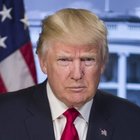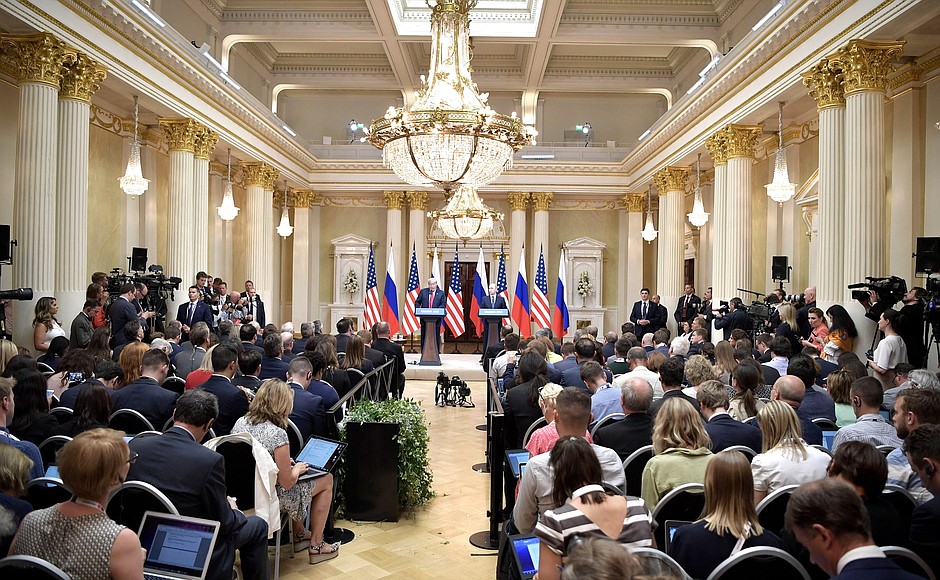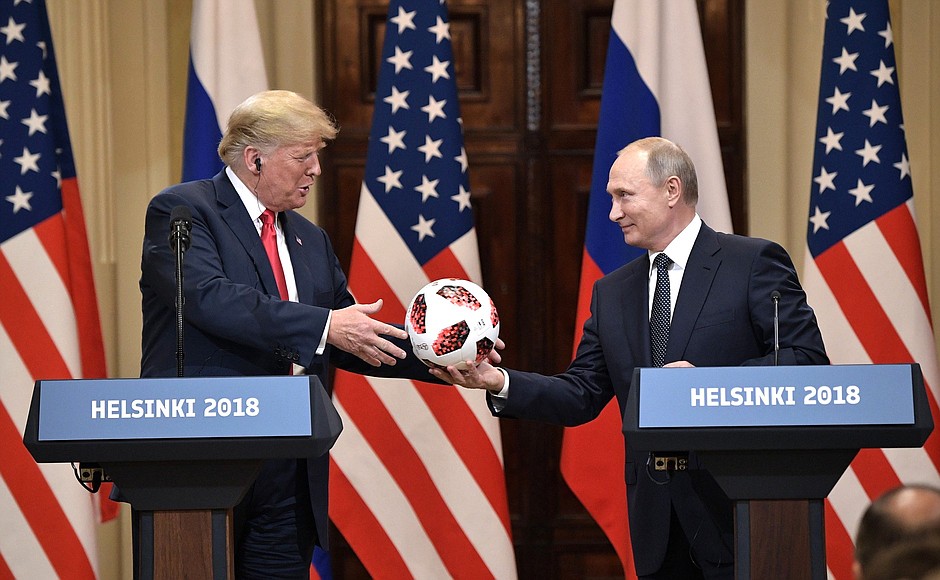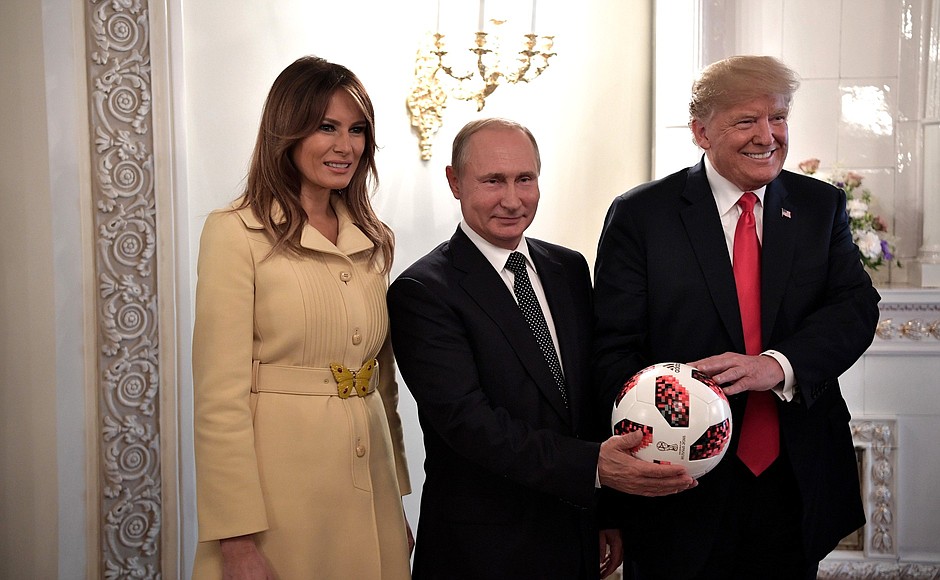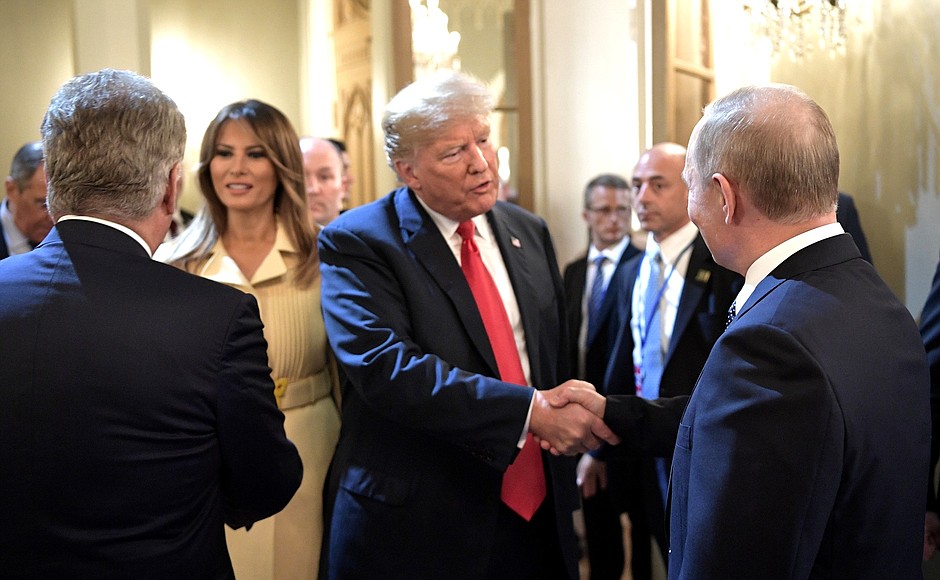President of Russia Vladimir Putin: Mr President, ladies and gentlemen,
The talks with President of the United States Donald Trump were held in a candid and business-like atmosphere. I think they were quite successful and beneficial.
We reviewed the current state and prospects of Russia-US relations and key international issues. It is obvious to everyone that our bilateral relations are undergoing a complicated period but there is no objective reason for these difficulties and the current tense atmosphere.
The Cold War ended long ago, the era of acute ideological confrontation belongs to the distant past, and the situation in the world has fundamentally changed.
Today both Russia and the United States are facing completely different challenges – the mechanisms of international security and stability are dangerously out of balance, there are regional crises, the spread of the threat of terrorism and cross border crime, crime in general, growing world economic problems, environmental and other risks. It is possible to cope with all this only by working together. I hope we will come to this same understanding with our American partners.
Today’s talks reflected the shared desire of President Trump and myself to correct the negative situation in bilateral relations and map out initial steps to improve them, restore an acceptable level of trust and return to the former level of cooperation on all issues of mutual interest.
As a major nuclear power, we have special responsibility when it comes to international security. I consider it important, as we discussed, to get the dialogue on strategic stability and the non-proliferation of weapons of mass destruction on track. We made a note with a number of concrete proposals on this matter available to our American colleagues.
We believe that continued joint efforts to fully work through the military-political and disarmament dossier is necessary. That includes the renewal of the Strategic Offensive Reductions Treaty, the dangerous situation surrounding the development of elements of the US global missile defence system, the implementation of the Treaty on the Elimination of Intermediate-Range and Shorter-Range Missiles, and the topic of deploying weapons in space.
We are in favour of continued cooperation in the sphere of combating terrorism and ensuring cybersecurity. Notably, our special services are working together quite successfully. The most recent example of that is the close operational interaction with a group of US security experts as part of the World Cup in Russia that ended yesterday. Contacts between the special services should be made systematic. I reminded the President of the United States about the proposal to reconstitute the anti-terror working group.
We covered regional crises extensively. Our positions do not coincide on all matters, but nonetheless there are many overlapping interests. We should be looking for common ground and working more closely, including at international forums.
Of course, we talked about regional crises, including Syria. With regard to Syria, restoring peace and harmony in that country could serve as an example of successful joint work.
Of course, Russia and the United States can take the lead in this matter and organise cooperation to overcome the humanitarian crisis and help refugees return to their hearths.
We have all the requisite elements for effective cooperation on Syria. Notably, Russian and American military have gained useful experience of interaction and coordination in the air and on land.
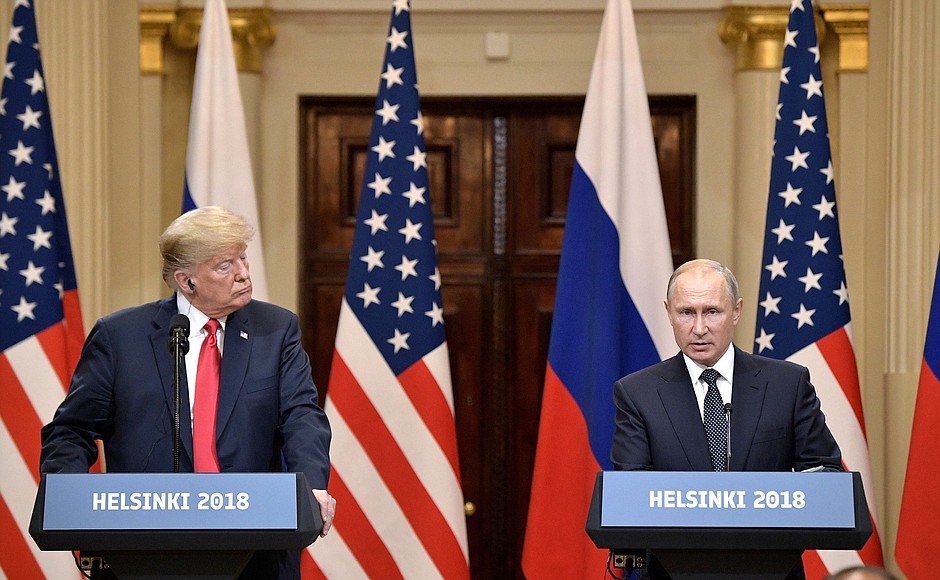
I would also like to note that after the terrorists are routed in southwest Syria, in the so-called “southern zone”, the situation in the Golan Heights should be brought into full conformity with the 1974 agreement on the disengagement of Israeli and Syrian forces.
This will make it possible to bring tranquillity to the Golan Heights and restore the ceasefire between the Syrian Arab Republic and the State of Israel. The President devoted special attention to this issue today.
I would like to emphasise that Russia has a stake in this course of events and will adhere to exactly this position. This will constitute a step towards establishing a just and durable peace on the basis of UN Security Council Resolution 338.
It is good that efforts to gradually solve the problem of the Korean Peninsula have begun. This became possible largely because President Trump got personally involved and pursued dialogue in the spirit of cooperation rather than confrontation.
During the talks we openly discussed Russia’s concern over the US withdrawal from the Joint Comprehensive Plan of Action on the Iranian nuclear issue. The US knows our position. It remains unchanged. To underscore, due to the nuclear deal Iran has become the country most heavily inspected by the IAEA. This guarantees the exclusively peaceful nature of the Iranian nuclear programme and facilitates the consolidation of the non-proliferation regime.
Returning to our discussion of the Ukrainian crisis, the importance of observing the Minsk agreements in good faith was noted. The United States could be more resolute in insisting on this and could motivate Ukraine’s leaders to engage in this work.
We paid special attention to the economy. Obviously, there is interest in cooperation in the business circles of both countries. The US delegation was one of the biggest at the St Petersburg International Economic Forum in May. It consisted of over 500 US entrepreneurs.
To develop trade and investment, President Trump and I agreed to establish a high-level group that would unite captains of Russian and American business. Business people better understand how to go about mutually beneficial cooperation. Let them consider what can be done and make recommendations.
Once again President Trump touched on the so-called Russian interference in the electoral process in the United States. I had to repeat what I said many times before, including during my personal meeting with the President: Russia has never and will never interfere in US domestic affairs, including the electoral process. We are ready to examine all concrete materials that may be presented, for example, in the framework of the cybersecurity working group, the establishment of which we discussed during our meeting in Hamburg.
And, of course, it is time to unfreeze Russian-US ties between civic organisations and in the cultural and humanitarian sphere. As you know, recently we received a delegation from the US Congress, which was considered almost a historic event, when it should be a regular occurrence.
On this note, we have proposed that the US President think not only on practical issues but also on the philosophy underlying long-term bilateral relations. It would be useful to involve experts on the history and nuances of Russian-US cooperation in this process.
Our idea is to establish an expert council composed of influential Russian and US political analysts, academics, prominent former diplomats and military officers, which would work on finding points of convergence and ways to put bilateral cooperation on a sustainable positive trajectory.
In general, we are satisfied with our first full-scale meeting. Let me say once again that before this, we had only met briefly at international forums. President Trump and I had a good conversation. I hope now we understand each other better, and I thank Donald for this.
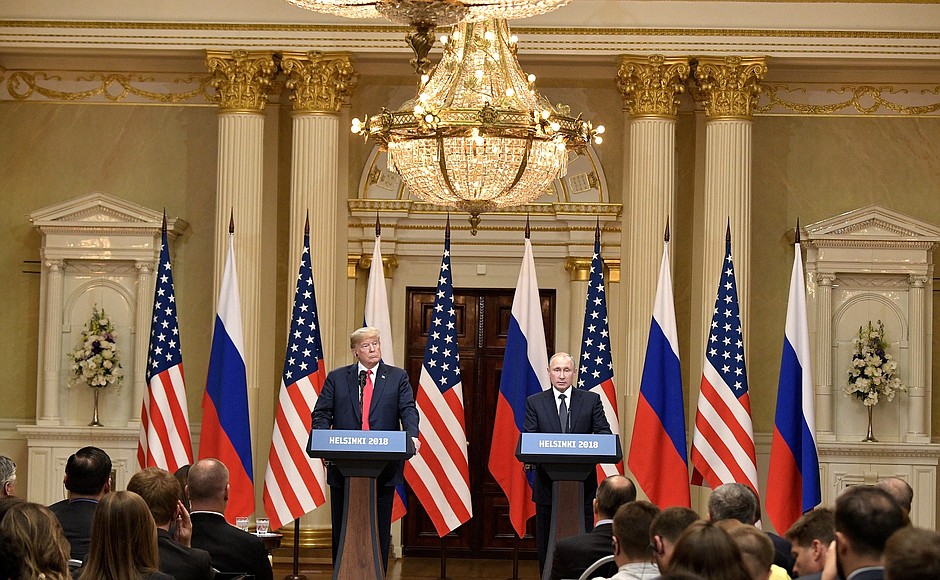
Of course, numerous problems remain. We have not managed to clear all the blockages, which would be impossible in one meeting. But I believe we have taken an important first step in this direction.
In conclusion I would like to note that our Finnish hosts helped to create the working atmosphere during the talks. I thank to the leadership of Finland, the Finnish people and residents of Helsinki for what they have done. We know that we have caused a lot of inconvenience for people in Helsinki and we apologise for this.
Thank you for your attention.
President of the United States Donald Trump: I have just concluded a meeting with President Putin on a wide range of critical issues for both of our countries. We had direct, open and deeply productive dialogue. It went very well.
Before I begin, I want to thank President Niinistö of Finland for graciously hosting today’s summit. President Putin and I were saying how lovely it was and what a great job they did. I also want to congratulate Russia and President Putin for having done such an excellent job in hosting the World Cup. It was really one of the best ever, and your team also did very well. It was a great job.
I am here today to continue the proud tradition of bold American diplomacy. From the earliest days of our republic, American leaders have understood that diplomacy and engagement is preferable to conflict and hostility. A productive dialogue is not only good for the United States and good for Russia, but it is good for the world.
The disagreements between our two countries are well-known. President Putin and I discussed them at length today. But if we are going to solve many of the problems facing our world, then we are going to have to find ways to cooperate in pursuit of shared interests. Too often in both the recent past and long ago we have seen the consequences when diplomacy is left on the table.
We have also seen the benefits of cooperation. In the last century our nations fought alongside one another in the Second World War. Even during the tensions of the Cold War, when the world looked much different than it does today, the United States and Russia were able to maintain a strong dialogue. But our relationship has never been worse than it is now.
However, that changed as of about four hours ago. I really believe that. Nothing would be easier politically than to refuse to meet, to refuse to engage, but that would not accomplish anything. As President, I cannot make decisions on foreign policy in a futile effort to appease partisan critics, or the media, or Democrats who want to do nothing but resist and obstruct.
Constructive dialogue between the United States and Russia forges the opportunity to open new pathways toward peace and stability in our world. I would rather take a political risk in pursuit of peace than to risk peace in pursuit of politics. As President, I will always put what is best for America and what is best for the American people.
During today’s meeting, I addressed directly with President Putin the issue of Russian interference in our elections. I felt that this was a message best delivered in person. We spent a great deal of time talking about it, and President Putin may very well want to address it, and very strongly, because he feels very strongly about it, and he has an interesting idea.
We also discussed one of the most critical challenges facing humanity: nuclear proliferation. I provided an update on my meeting last month with Chairman Kim on the denuclearisation of North Korea, and after today I am very sure that President Putin and Russia want very much to end that problem. They are going to work with us, and I appreciate that commitment.
The President and I also discussed the scourge of radical Islamic terrorism. Both Russia and the United States have suffered horrific terrorist attacks, and we have agreed to maintain open communication between our security agencies to protect our citizens from this global menace. Last year we told Russia about a planned attack in St Petersburg, and they were able to stop it cold. They found them, they stopped them, there was no doubt about it. I appreciated President Putin’s phone call afterwards to thank me.
I also emphasised the importance of placing pressure on Iran to halt its nuclear ambitions and to stop its campaign of violence throughout the area, throughout the Middle East.
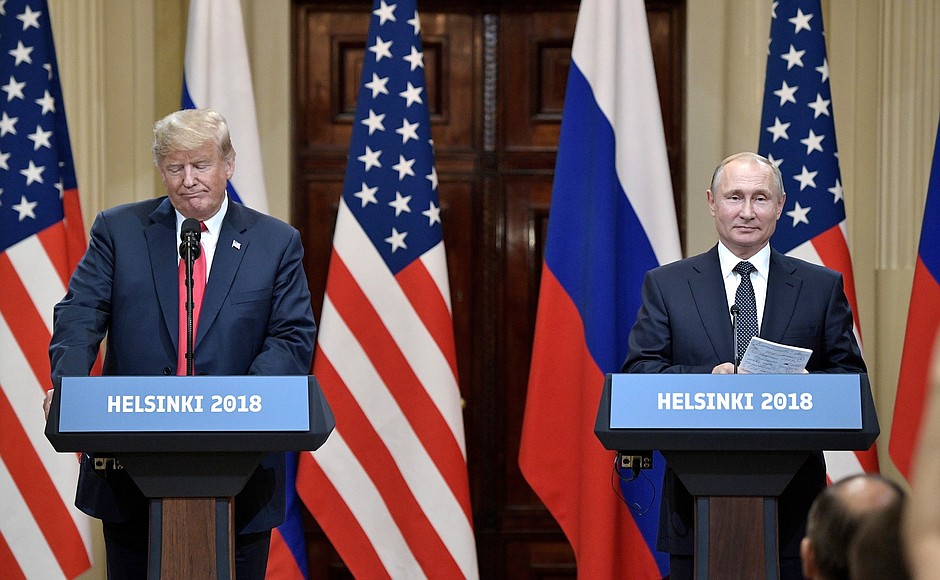
As we discussed at length, the crisis in Syria is a complex one. Cooperation between our two countries has the potential to save hundreds of thousands of lives. I also made clear that the United States will not allow Iran to benefit from our successful campaign against ISIS. We have just about eradicated ISIS in the area.
We also agreed that representatives from our national security councils will meet to follow up on all of the issues we addressed today and to continue the progress we have started right here in Helsinki.
Today’s meeting is only the beginning of a longer process, but we have taken the first steps towards a brighter future, and one with a strong dialogue and a lot of thought. Our expectations are grounded in realism, but our hopes are grounded in America’s desire for friendship, cooperation and peace, and I think I can speak on behalf of Russia when I say that also.
President Putin, I want to thank you again for joining me for these important discussions and for advancing open dialogue between Russia and the United States. Our meeting carries on a long tradition of diplomacy between Russia and the United States for the greater good of all. And this was a very constructive day, these were very constructive few hours that we spent together. It is in the interests of both of our countries to continue our conversation, and we have agreed to do so. I am sure we will be meeting again in the future often, and hopefully we will solve every one of the problems that we discussed today.
So again, President Putin, thank you very much.
Question: I have a question for the President of the United States.
During your recent European tour, you said that the Nord Stream 2 pipeline project and other projects make Europe hostage to Russia. You suggested saving Europe from this dependence by supplying US liquefied gas.
This past cold winter proved the viability of the current energy supply system in Europe, at a time where the United States was forced to buy additional liquefied gas, including from Russia, to cover the heating needs of Boston.
So, my question: is your idea more of a political nature? Might it lead to a situation where a gap could develop in Europe’s energy supply system which would impact primarily the consumer countries?
And a second question, if I may. Before the meeting with Mr Putin, you called him a rival, but left hope that, perhaps, you would be able to take these relations to a friendly plane. Did you succeed?
Donald Trump: No, actually, I called him a competitor, and a good competitor he is. And I think the word ‘competitor’ is a compliment. I think that we will be competing when you talk about the pipeline. I am not sure necessarily that it’s in the best interests of Germany or not, but that was a decision that they made. We will be competing. As you know, the United States is now – or soon will be, but I think it tactually is right now – the largest in the oil and gas world, so we are going to be selling LNG and will have to be competing with the pipeline. And I think we will compete successfully, although there is a little advantage locationally. So I just wish them luck, I mean, I did discuss it with Angela Merkel in pretty strong tones, but I also know where they all are coming from and they have a very close source, so we will see how that all works out. But we have lots of sources now, and the United States is much different than it was a number of years ago, when we weren’t able to extract what we can extract today. So, today we are number one in the world at that and I think we will be out there competing very strongly. Thank you very much.
VladimirPutin: I would like to add a couple of words to that.
I spoke with the President, including on this topic. We are aware of the President’s position. But I believe that we, as a major oil and gas country – and the United States is also such a country – could work constructively to regulate international markets, because we are not interested in a sharp drop in prices below the lower limit. Our producers, including the United States with its shale oil and gas, will be affected by this.
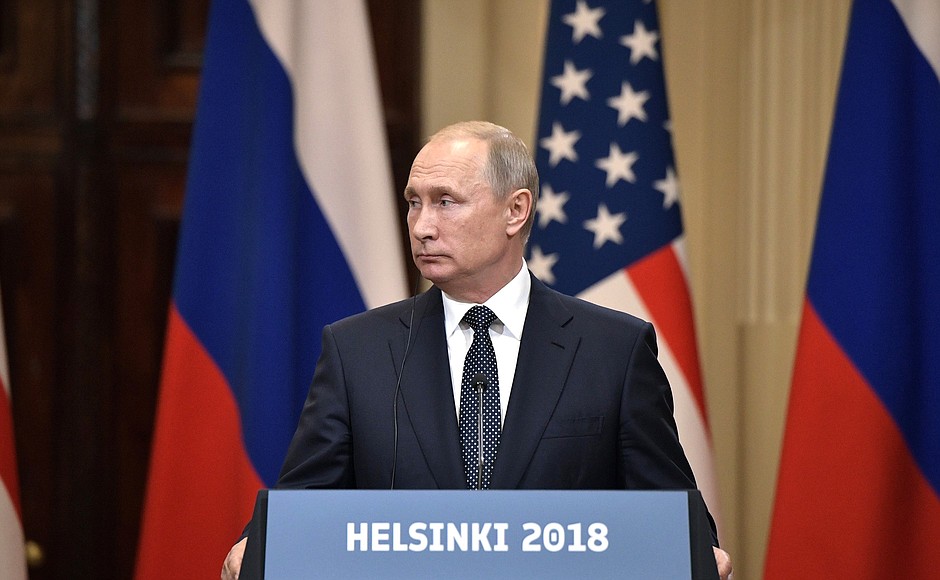
The profit margin of production comes to naught below certain levels. We are not interested in excessively high prices either, because they can kill refining, engineering and other branches of the economy. We have things to discuss and there is room for cooperation. This is my first point.
Second, with regard to Nord Stream 2, the President expressed concerns about the possible end of transit across Ukraine. I assured him that Russia is willing to keep this transit in place. Moreover, we are willing to renew the transit contract, which expires next year, if the dispute between economic agents is settled in the Stockholm Arbitration Court.
Question: Mr President, you tweeted this morning that it is US “foolishness”, “stupidity” and the Mueller probe that are responsible for the decline in US relations with Russia. Do you hold Russia at all accountable for anything in particular, and if so, what would you consider that they are responsible for?
Donald Trump: Yes, I do. I hold both countries responsible. I think that the United States has been foolish, I think we have all been foolish: we should have had this dialogue a long time ago. A long time, frankly, before I got to office. And I think we are all to blame. I think now the United States now has stepped forward along with Russia, and we are getting together, and we have a chance to do some great things, whether it is nuclear proliferation in terms of stopping – because we have to do it ultimately, that is probably the most important thing that we can be working on. But I do feel that we have both made some mistakes. I think that the probe is a disaster for our country. I think it has kept us apart. It kept us separated. There was no collusion at all. Everybody knows it. People are being brought out to the fore – so far that I know, virtually none of it related to the campaign – and they are going to have to try really hard to find somebody that did relate to the campaign. That was a clean campaign. I beat Hillary Clinton easily and, frankly, we beat her – and I am not even saying from the standpoint…we won that race, and it is a shame there can be even a little bit of cloud over it. People know that, people understand it, but the main thing – and we discussed this also – is zero collusion. And it has had a negative impact upon the relationship of the two largest nuclear powers in the world. We have 90 percent of nuclear power between the two countries. It’s ridiculous, it’s ridiculous what is going on with the probe.
Question: For President Putin, if I could follow up as well… Why should Americans and why should President Trump believe your statement that Russia did not intervene in the 2016 election given the evidence that US intelligence agencies have provided? And will you consider extraditing the 12 Russian officials that were indicted last week by a US grand jury?
Donald Trump: We, I’m going to let the President answer the second part of this question, but, as you know, the whole concept of that came up perhaps a little bit before, but it came out as a reason why the Democrats lost an election, which, frankly, they should have been able to win, because the Electoral College is much more advantageous for Democrats, as you know, than it is for Republicans. We won the Electoral College by a lot – 306 to 223, I believe – and that was a well-fought battle. We did a great job, and, frankly, I am going to let the President speak to the second part of your question, but just to say it one time again, and I say it all the time: there was no collusion; I didn’t know the President; there was nobody to collude with; there was no collusion with the campaign. And every time you hear about all of these twelve or fourteen, it’s stuff that has nothing to do – and frankly, they admit – these are not people involved in the campaign. But to the average reader out there, they are saying well, maybe that does. It doesn’t. And even the people involved – some, perhaps, told mysteries, or in one case the FBI said there was no lie, and somebody else said there was. We ran a brilliant campaign, and that is why I am President. Thank you.
VladimirPutin: Regarding whom you can believe and whom you can’t, you shouldn’t believe anyone. What makes you think President Trump trusts me and that I fully trust him? He defends the interests of the United States of America. I defend the interests of the Russian Federation. We do have converging interests, and we are seeking common ground. We have issues that we disagree on so far. We are seeking options to settle these differences and make our work more constructive.
We should not rely on the momentary political interests of some internal political forces in our countries but on facts. Tell me at least one fact that proves collusion during the election campaign in the United States. This is total nonsense. We did not know each other, the President just said this. It is only natural that the Russian public developed a certain attitude towards the candidates. There is nothing unusual about this.
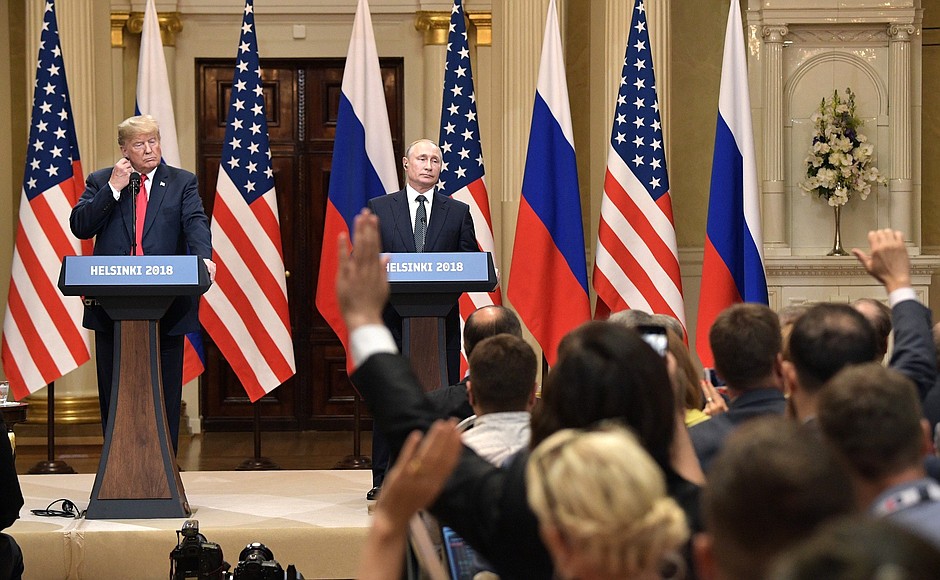
While a candidate, Mr Trump spoke of the necessity to restore Russia-US relations. Naturally, the Russian public developed a liking for this candidate, and different people expressed this attitude in different ways. Isn't it natural to have a liking for a person who wants to build relations with our country? This is normal.
We heard accusations against the company Concord. As I understand it, this company hired American lawyers, and the accusations against it just fell apart in a US court. Just follow what happens in US courts. This is what you should base your view on, not on rumours. This is the first thing.
Second, as for the 12 alleged Russian intelligence officers, I don’t know about this yet. I have to find out what it is you’re talking about. The President also asked me this question.
What can I say? Generally, we talked about this, but now it occurs to me what I can suggest. There is the Treaty between the United States and the Russian Federation on Mutual Legal Assistance in Criminal Matters of 1999. By the way, this has proven effective. We initiate up to 150 legal proceedings in Russia at the request of other countries. Several years ago, our former nuclear industry minister was extradited by the United States to Russia and received a sentence in court here. It is an effective treaty. The treaty provides concrete procedures for cooperation.
We can suggest that your relevant commission led by US Special Counsel – what is his name, Mr Mueller or Meller? – should send us, in compliance with this treaty, an official request for interrogating the people that he believes to be guilty of committing a crime. Our Prosecutor-General’s Office and investigative agencies can interrogate these people and forward the relevant materials to the United States.
Moreover, we can take another step to meet you halfway. We can allow US official representatives, including those from the Mueller-led commission, to be present at the interrogation. Certainly, in this case, we will be seeking reciprocal steps from the United States. We’ll expect the American party to interrogate the officials, including the US intelligence officers, who are suspected of committing illegal acts in Russia, in the presence of our investigation officers.
I mean the high-profile case, involving [Bill] Browder’s Hermitage Capital company. According to our investigative officers, a group of people – Mr Browder’s business partners – who illegally made over $1.5 billion in Russia did not pay taxes either in Russia or the United States but transferred this money to the United States. They contributed $400 million to Ms Clinton’s election campaign. This is official information included in their reports – $400 million. Well, it was up to them, they might have done this legally, but the gains were ill-gotten.
We have grounds to suspect that US intelligence officers supported these illegal transactions. This is only one step forward. We can talk about expanding our cooperation. You’re welcome, there might be options that are provided for in the appropriate intergovernmental treaty.
Question: My first question is for Mr Trump in English. Mr President, would you please go into the details of any possible specific arrangements for the US to work together with Russia in Syria, if any of this kind of arrangements were made today or discussed?
If you allow me, a question for President Putin in Russian too. As the subject of football was touched upon several times today, I will ask my question in the language of football. Mr Pompeo said a little earlier that when it comes to discussing coordinated activities in Syria, it’s Russia’s ball now. Mr President, is this true? If so, how did you take advantage of having possession?
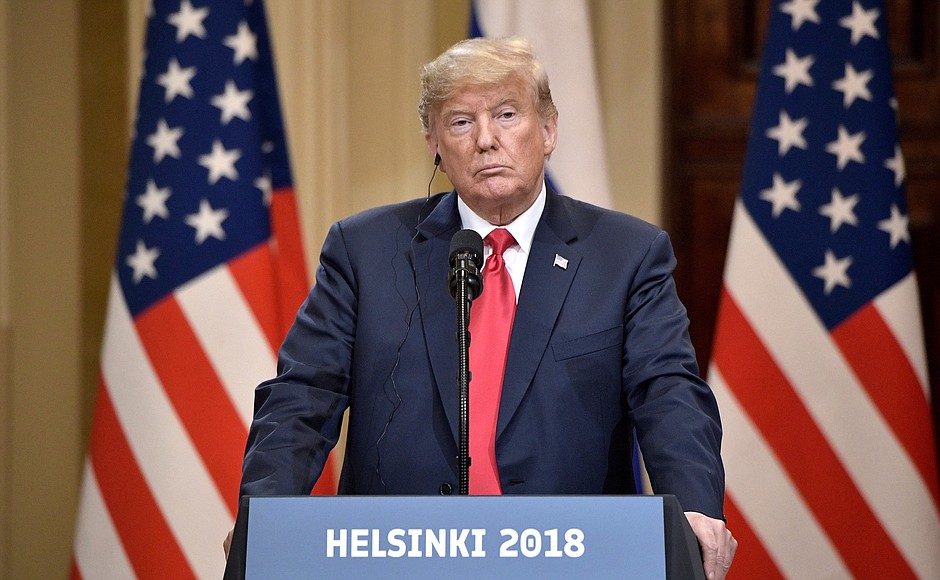
Donald Trump: Well, I guess I will answer the first part of the question.
We’ve worked with Israel long and hard for many years, many decades. I think that never has any country been closer than we are. President Putin also is helping Israel, and we both spoke with Bibi Netanyahu. And they would like to do certain things with respect to Syria, having to do with the safety of Israel. So, in that respect we absolutely would like to work in order to help Israel, and Israel will be working with us, so both countries would work jointly. And I think that when you look at all the progress that has been made in certain sections with the eradication of ISIS – we’re about 98–99 percent there – and other things that have taken place that we have done and that, frankly, Russia has helped us within certain respects. But I think that working with Israel is a great thing, and creating safety for Israel is something that both President Putin and I would like to see very much.
One little thing I might add to that is the helping of people. The helping of people – because you have such horrible…if you see…and I have seen the reports, and I have seen pictures. I have seen just about everything. And if we can do something to help the people of Syria get back into some form of shelter on a humanitarian basis. And that’s what the word was, really: a humanitarian basis. I think that both of us would be very interested in doing that, and we will do that. Thank you very much.
Question: Excuse me, but for now no specific agreements, for instance, between the militaries?
Donald Trump: Well, our militaries do get along. In fact, our militaries actually have gotten along probably better than our political leaders for years, but our militaries do get along very well and they do coordinate in Syria and other places. Ok? Thank you.
Vladimir Putin: I have already mentioned that we spoke about humanitarian cooperation. I discussed this issue with the President of France, Mr Macron, yesterday and we agreed to step up these efforts with European countries, France included. On our part, we are ready to provide military transport aircraft for humanitarian cargoes. President Trump and I spoke about this as well, and I believe there is room for improvement here.
What is important? Now large numbers of refugees are concentrated in countries bordering on Syria, such as Turkey, Lebanon, Jordan. If we help these people return home, the migration pressure on European Union countries and other countries could be reduced multiple times over. I consider this to be extremely important from all standpoints: both from the humanitarian standpoint, and that of solving the refugee problem.
On the whole, I really agree with the President. Our military cooperation is going quite well. I hope that they will continue to be able to come to agreements just as they have been. We will keep working in the Astana format as well, I mean Russia, Turkey and Iran. I also informed Donald about this today. We are willing to link these efforts with the efforts of the so-called small group of countries to make this a broad process and for us to have the greatest chance of success.
As for the ball being on our side where Syria is concerned. The President just mentioned that we successfully organised and hosted the World Cup. As for the ball… I would like to pass the ball to the President, all the more so because the US will host the World Cup in 2026.
Donald Trump: That’s right, thank you very much, we do host it, and we hope we do as good a job. That is very nice. That will go to my son Barron, there is no question. In fact, Melania, here you go.
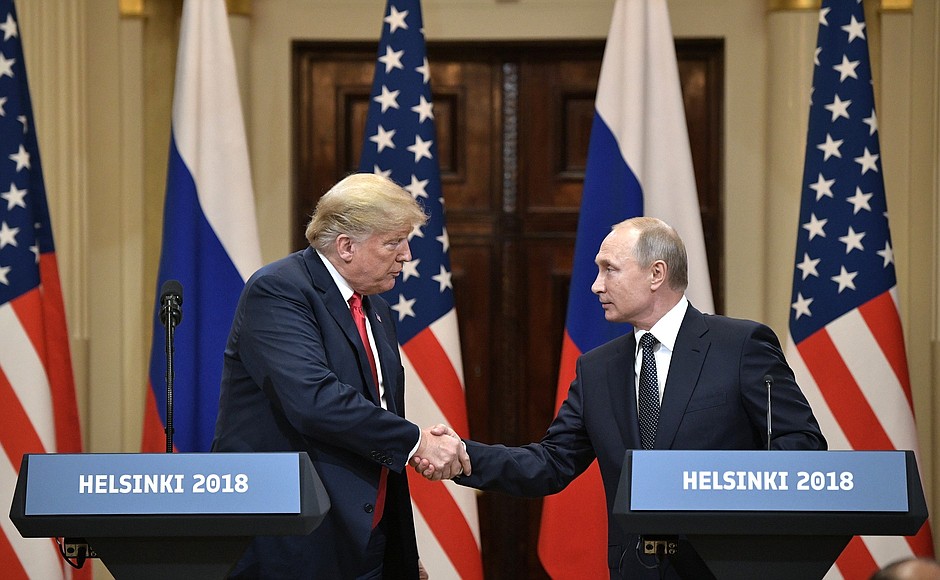
Question: Thank you. A question for each president. President Trump, you first. Just now, President Putin denied having anything to do with the election interference in 2016. Every US intelligence agency has concluded that Russia did. My first question for you, sir, is who do you believe? My second question is, would you now, with the whole world watching, tell President Putin? Would you denounce what happened in 2016 and would you warn him to never do it again?
Donald Trump: So let me just say that we have two thoughts. You have groups that are wondering why the FBI never took the server. Why haven’t they taken the server? Why was the FBI told to leave the office of the Democratic National Committee? I have been wondering that, I have been asking that for months and months, and I have been tweeting it out, and I have been calling it out on social media. Where is the server? I want to know. Where is the server and what is the server saying? With that being said, all I can do is ask the question. My people came to me, Dan Coats came to me and some others. They said they think it is Russia. I have President Putin – he just said it is not Russia. I will say this: I do not see any reason why it would be.
But I really do want to see the server. But I have confidence in both parties. I really believe that this will probably go on for a while, but I don’t think it can go on without finding out what happened to the server. What happened to the servers of the Pakistani gentleman that worked on the DNC. Where are the servers? They’re missing. Where are they? What happened to Hillary Clinton’s emails? 33,000 emails gone, just gone. I think in Russia, they would not have been gone so easily. I think it is a disgrace that we can’t get Hillary Clinton’s 33,000 emails.
So, I have great confidence in my intelligence people, but I will tell you that President Putin was extremely strong and powerful in his denial today. And what he did is an incredible offer: he offered to have the people working on the case come and work with their investigators with respect to the 12 people. I think that’s an incredible offer. OK. Thank you.
Vladimir Putin: Let me add a couple of words to that.
I have worked in intelligence too, and I know how these dossiers are compiled. This is my first point.
My second point is that I consider Russia to be a democratic state. I hope you do not deny this to your country, the United States of America, either. Is the United States a democratic state? If so, then the final ruling in a dispute of this kind can only be made in court, not an intelligence service.
The company I mentioned, Concord, and one of our restaurateurs are being accused of interference. However, they do not represent the Russian state. Even if that is the case, I can imagine. So what? I have given you examples. You have many people, including those with major billion-dollar fortunes, such as Mr Soros. He interferes everywhere he can, but what is this? Is it the position of the American state? No. This is the position of a private person. So it is in this case.
There is a trial in a US court, and the court is always the final instance. Let them figure it out, we will see. This applies to private individuals only, not to the state. I have already spoken about the latest accusations against the alleged employees of our special services. There is an intergovernmental agreement. Go ahead and send an official request. Let the Mueller Commission send us a request, we will do our part and provide an answer.
We can expand this cooperation, as I already mentioned, but only on a reciprocal basis. We, then, would also expect the United States to provide access to the persons we believe are the special services employees. Let's discuss these matters in substance rather than use Russia-US relations as a bargaining chip in the domestic political strife in the United States.
Question: A question for President Putin, thank you. Two questions for you, sir. Could you tell me what President Trump may have indicated to you about officially recognising Crimea as part of Russia? And secondly, sir, do you, does the Russian government have any compromising material on President Trump or his family?
Vladimir Putin: President Trump sticks to a well-known position on Crimea. He speaks about the illegal nature of annexing Crimea to Russia. We have a different perspective on this. We believe that we held a referendum in strict compliance with international law and the UN Charter. This case is closed for Russia. This is my first point.
My second point is with regard to some compromising materials. I heard about us allegedly collecting dirt on Mr Trump when he was in Moscow. Colleague, when Mr Trump came to Moscow, I was not even aware that he was there. I respect President Trump as head of the United States, but when he came here as a businessman, I was not even aware that he was in Moscow.
Over 500 high-ranking US businessmen came to the St Petersburg Economic Forum. I do not even remember their names. Do you think we are doing intelligence work and collecting compromising material on each one of them? It is hard to imagine bigger nonsense. Please get this rubbish out of your head.
Question: A question for President Putin, thank you. Two questions for you, sir. Could you tell me what President Trump may have indicated to you about officially recognising Crimea as part of Russia? And secondly, sir, do you, does the Russian government have any compromising material on President Trump or his family?
Vladimir Putin: President Trump sticks to a well-known position on Crimea. He speaks about the illegal nature of annexing Crimea to Russia. We have a different perspective on this. We believe that we held a referendum in strict compliance with international law and the UN Charter. This case is closed for Russia. This is my first point.
My second point is with regard to some compromising materials. I heard about us allegedly collecting dirt on Mr Trump when he was in Moscow. Colleague, when Mr Trump came to Moscow, I was not even aware that he was there. I respect President Trump as head of the United States, but when he came here as a businessman, I was not even aware that he was in Moscow.
Over 500 high-ranking US businessmen came to the St Petersburg Economic Forum. I do not even remember their names. Do you think we are doing intelligence work and collecting compromising material on each one of them? It is hard to imagine bigger nonsense. Please get this rubbish out of your head.
Donald Trump: I have to say if they had it, it would have been out long ago. And if anybody watched Peter Strzok testify over the last couple of days, and I was in Brussels watching it, it was a disgrace to the FBI, it was a disgrace to our country, and you would say that was a total witch hunt. Thank you very much, everybody. Thank you.
